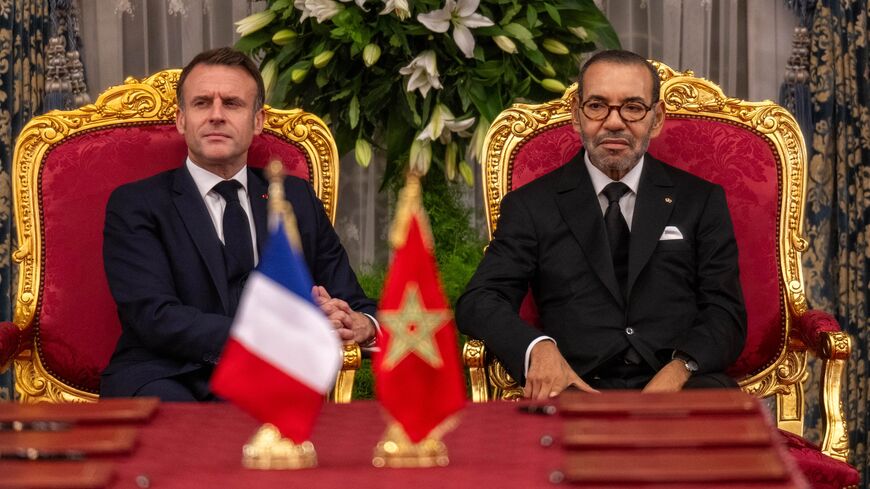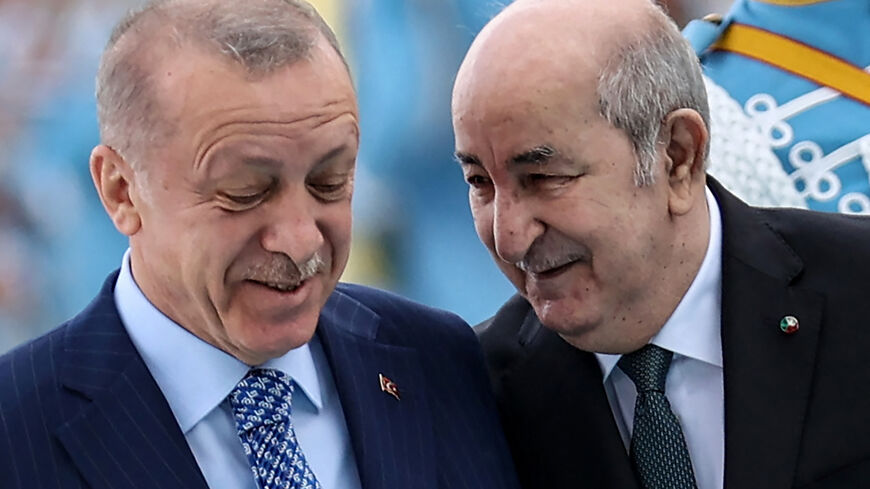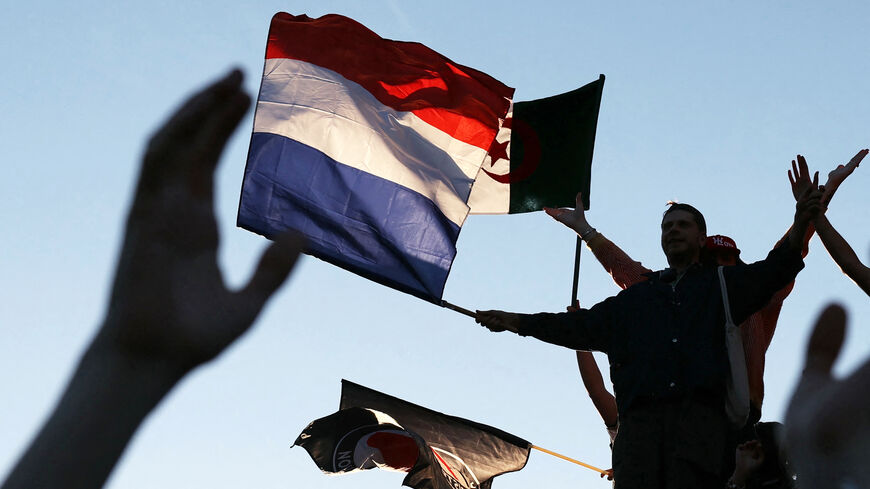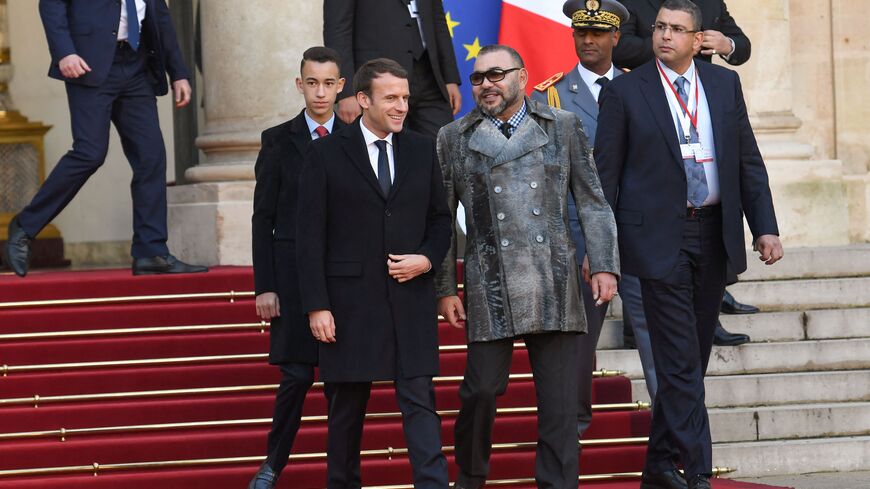Relations between France, Algeria grow cooler over Morocco ties
The latest trip of French President Emmanuel Macron to Rabat was the last straw in the already shaky relations between Paris and Algiers.
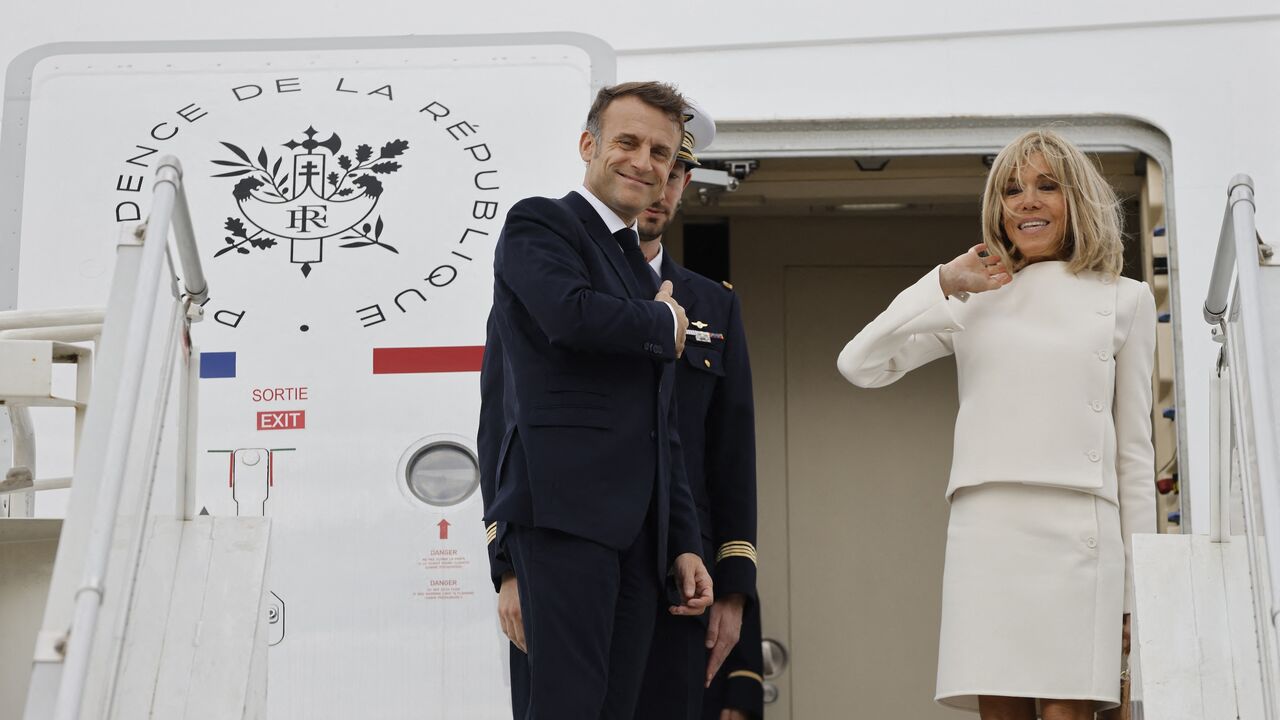
PARIS — Bilateral relations between France and Algeria have been reduced to a bare minimum in recent months as disagreements between Paris and Algiers continue to accumulate, and Algerian President Abdelmadjid Tebboune's visit to France — which was originally set for 2023 and has been repeatedly postponed — is nowhere in sight.
"France had a choice to make. It had to choose between its yearlong cold relations with Algeria … and restoring ties with Morocco following years of diplomatic crises, and it picked Morocco," political science expert Jean-Noel Ferrie told Al-Monitor. Ferrie, research director at the French CNRS and at Sciences Po Bordeaux, has been living and teaching for many years both in France and North Africa.
On Nov. 7, the Algerian government denied rumors that had been circulating the prior week about a possible suspension of trade between the two countries. These reports, published by Le Figaro and other French media, claimed that Algiers had decided to block import-export operations with Paris. The Algerian authorities described these claims as “erroneous and totally unfounded.”
Still, while such a decision has evidently not been adopted by Algerian authorities, other decisions limiting bilateral relations are apparently being considered by Algeria following the visit of French President Emmanuel Macron to neighboring rival Morocco on Oct. 28.
A pile of disagreements
Tensions between the two countries go back almost two centuries to the long colonization of Algeria by France and the bloody Algerian war of independence, which ended in 1962. The Algerian war continued over the years to define bilateral relations, especially since the anti-French Algerian National Liberation Front remained in power for several decades. The Algerian community in France is the largest diaspora in the country, with nearly 900,000 dual nationals as of 2022.
Since first taking office in 2017, French President Emmanuel Macron championed a new approach to the history of colonization, especially the Algerian war, as the wounds resulting from this period are still raw. Still, the long and complicated reconciliation process has not yet yielded the results Macron was hoping for, with the Algerian government claiming that France has not taken full responsibility for the crimes committed during these years.
French-Algerian trade reached 11.8 billion euros in 2023 — a 5.3% increase compared with 2022. That being said, while trade relations are strong and expanding, Algiers remains suspicious of Paris. Several measures taken by Paris in the past three years, especially concerning immigration and the status of Western Sahara, have negatively affected these relations.
In 2021, the French government decided to reduce the number of visas given to Algerians and Moroccans by half, and to Tunisians by 30%, accusing the three countries of not fulfilling their part in taking back illegal immigrants. Algeria recalled its ambassador in France for several months and summoned the French ambassador in the country. Another complicated affair is that of Hirak pro-democracy movement militant Amira Bouraoui, a dual Algerian French national who managed to travel to France in the beginning of 2023 despite being convicted in Algeria. Later that year, during the military coup in neighboring Niger, Algeria prevented French military airplanes from crossing its air space.
The Western Sahara hurdle
These are just some of the incidents that clouded bilateral relations between France and Algeria in the past few years. But the breaking point has certainly been the de facto recognition by France last July of Morocco’s sovereignty over the Western Sahara region. From the outset Algeria has supported the nationalist Polisario Front movement, which has been fighting since the 1960s for an independent Saharawi state. Rabat, in contrast, has been claiming that the so-called Southern Province is part of the Moroccan state.
Over the years, France had tried to walk a fine line between the two countries, but with growing pressure by Morocco has changed its mind. A letter sent by Macron to King Mohammed IV three months ago recognized Moroccan sovereignty as the "sole base" for the present and future of Western Sahara.
The Algerian president's visit, repeatedly postponed since May 2023, was expected to take place either late September or early October 2024 according to a statement by the Elysee Palace some six months ago. But the publication of the letter changed all that. Algiers immediately recalled its ambassador from Paris and reduced its diplomatic representation, keeping only a charge d'affaires. The expected visit of Tebboune was cancelled without any future date.
Relations between Paris and Algiers became even frostier when Macron traveled to Morocco end of October, in a grand gesture of reconciliation, repeating the new French formula over the status of Western Sahara. While some prominent Algerian newspapers like El Khabar ignored the visit of Macron to Morocco, as if it didn’t happen, other Algerian outlets responded with intense criticism. El Watan, for instance, published that “Macron flouts international law,” accusing the French president of exacerbating regional tensions by aligning with Moroccan interests.
Diplomatic isolation
"The recognition of the Moroccan sovereignty over Western Sahara by the Trump administration in 2020 was a first in a series of diplomatic moves that Algeria had to cope with in recent years," pointed out Ferrie.
"In 2022, Spain changed its tone and fell in line with Morocco over its autonomy plan for Western Sahara (against the demand by the Polisario Front for a referendum on independence). This was another blow to Algeria. Then we have the strong positioning of Morocco in continental Africa. Algeria sees itself in competition with Morocco. And so, the rapprochement between Paris and Rabat is something that Algiers cannot accept," he added.
Ferrie argued that as a non-African power, it is not the role of Paris to create a balance between the two neighboring rivals. Also, he estimated that the so-called memorial politics championed by Macron failed to get the two countries closer, in part because of the current Algerian regime with its military elements.
"Of course, the number one disagreement of Algeria is vis-a-vis Morocco, more than France, but chances of solving that are slim. Morocco would never renounce on its claim to the Western Sahara, and Algeria will never accept Moroccan sovereignty over this region."
Algeria is the largest African country and the third-largest Arab economy. A 2024 World Bank review stated that "the main challenge for the Algerian economy remains the high dependency on hydrocarbon revenues and public spending." According to Ferrie, Algeria had failed to leverage its natural resources, remaining largely isolated diplomatically. For instance, it failed to join in the latest BRICS enlargement in the 2023 summit in South Africa.
Algerian youth desperate
According to the World Bank, despite its natural resources and its tourism potential, unemployment was estimated at 12.7% overall and at 30.8% among young people (aged 15 to 24) in 2023. Algerians people with whom Al-Monitor spoke expressed pessimism as for their future in the country.
"I travel often to Algiers to visit my family, and every time I go there, the cost of living has become more expensive while accessibility to healthcare scarcer," a French Algerian student told Al-Monitor on condition of anonymity.
"For many young Algerians, Paris is no longer a dream destination because they see on the social media that in France as well the economic situation is complicated. Instead, they want to immigrate to Canada, or to other places. That is why the young people talk much more English than French. It’s a different generation," noted the French Algerian student, adding that "the quarrel with France has little significance in their eyes. They simply don’t care."



